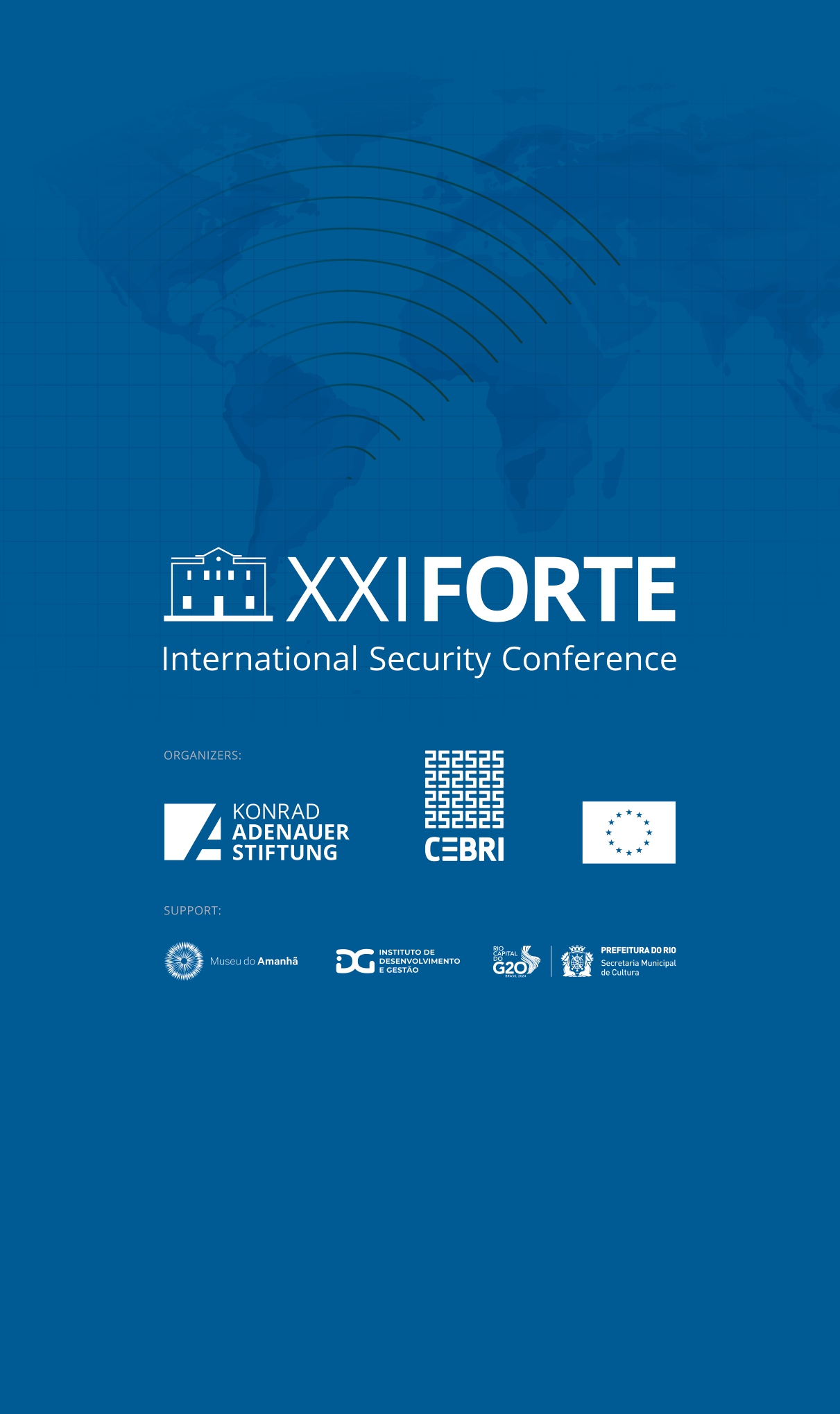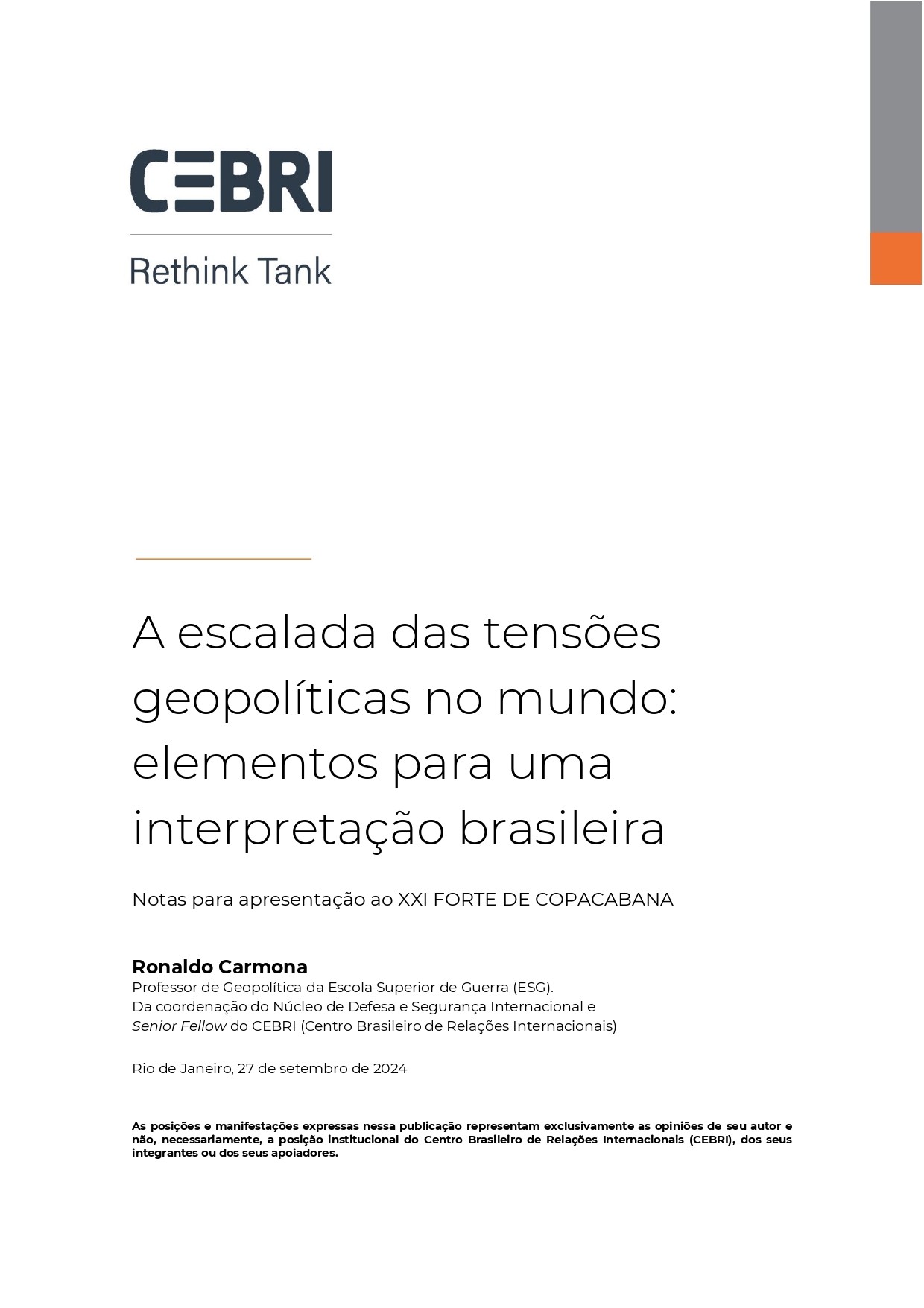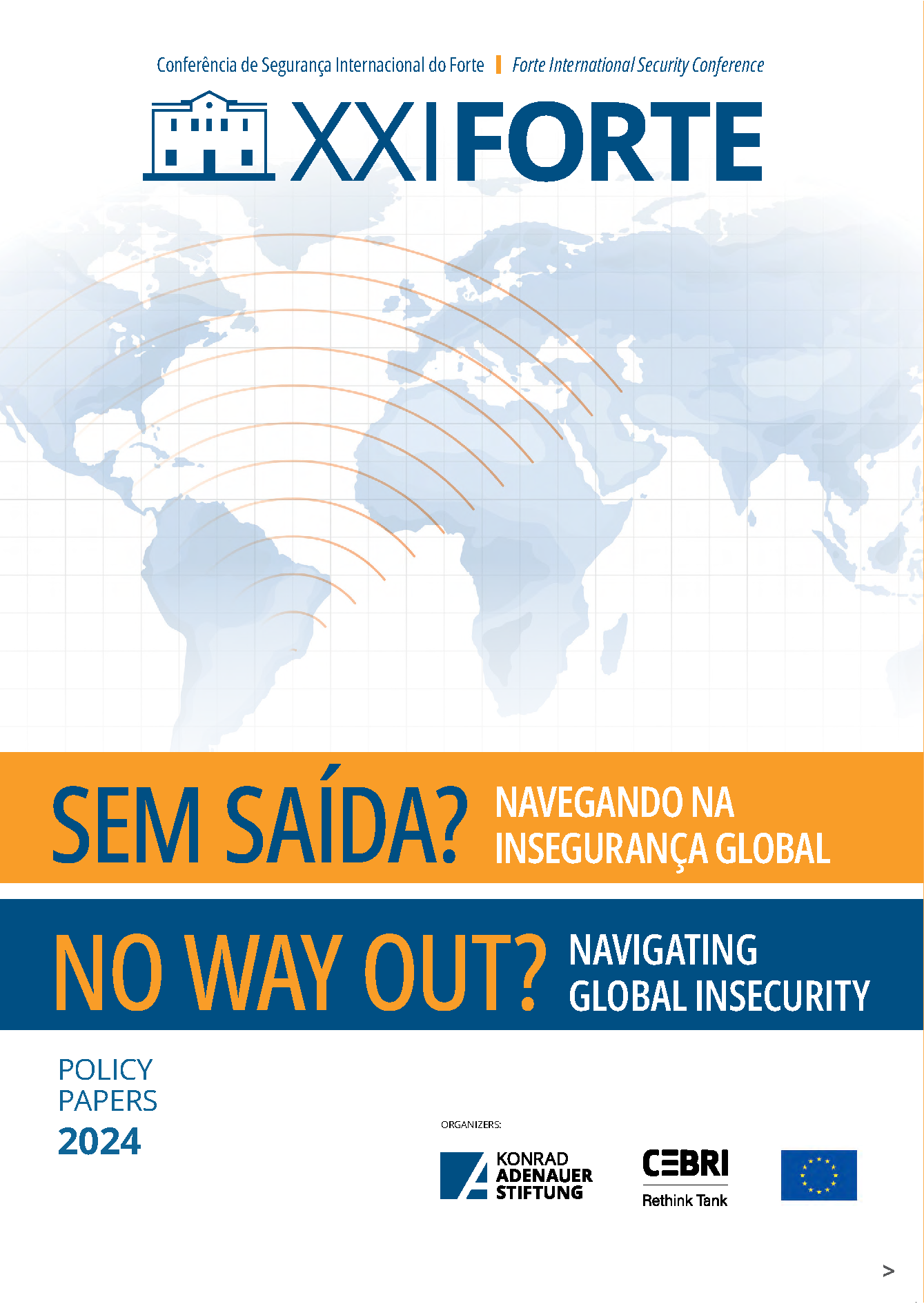Conferences
XXI Forte International Security Conference| No way out? Navigating Global Insecurity
Today’s global landscape is marked by an increase in international conflicts, as evidenced by the Russia-Ukraine and the Israeli-Hamas wars. The intricate geopolitical tapestry contributes to uncertainty and challenges the delicate balance of global stability.
Compounding these challenges is the rapidly changing dynamics of organized crime in Latin America and the growing influence of transnational criminal groups. These groups fuel violence and threaten the social and political stability of nations, especially in Latin America. These criminal entities are diversifying into new markets, extending their reach from cybercrime to the extraction and illicit trade of environmental commodities, making them a global phenomenon.
Amidst this complex and uncertain scenario, traditional pillars of multilateralism are under strain, struggling to cope effectively with the myriad challenges effectively. This puts the post-Cold War liberal order at risk, as the efficacy of global collaborative efforts is questioned.
To foster consensus and address pressing global issues, the G20 plays a crucial role. Annually, leaders of the world’s nineteen largest economies, along with the European Union and the African Union, convene to discuss key aspects of the international order. The upcoming G20 summit in Rio de Janeiro is significant as a pivotal moment for international dialogue amidst growing distrust in global governance institutions and multilateralism.
The Forte International Security Conference emerges with a distinct mission – to shed light on primary challenges to international security, focusing on Europe and Latin America. Revolving around the broader context of global challenges affecting the current international order, the conference aligns itself with the G20 Brazil
As Latin America’s largest international security conference, the Forte International Security Conference has for over two decades fostered meaningful discussions on common security issues, in collaboration with Europe. This year, the Forte Conference expands its scope, to engage in a dialogue transcending regional boundaries, and seeking common paths to navigate the evolving international security landscape.
See the full program:
OPENING REMARKS
09:00 – 09:15 (BRT/UTC-3)
14:00 – 14:15 (CEST/UTC+2)
Maximilian Hedrich, Director of the Konrad Adenauer Foundation in Brazil
José Pio Borges, Chairman of the Board of Trustees at the Brazilian Center for International Relations (CEBRI)
Marian Schuegraf, Ambassador of the European Union Delegation to Brazil
KEYNOTE SPEECH – Security Challenges in an Unraveling World
09:20 – 10:20 (BRT/UTC-3)
14:20 – 15:20 (CEST/UTC+2)
José Múcio Monteiro, Minister of Defence, Brazil
Juan Battaleme, Secretariat for International Defense Affairs (SAID) of the Ministry of Defense of the Argentine Republic (MINDEF), Argentina
Cosmin Dobran, Director for Peace, Partnerships and Crisis Management at European External Action Service, Brussels
Moderation: Marcia Loureiro, Ambassador, Ministry of Foreign Affairs, Brazil
PANEL 1 – Forging new paths for Multilateralism
10:25 – 11:30 (BRT/UTC-3)
15:25 – 16:30 (CEST/UTC+2)
Melina Risso, Director of Igarapé Institute, Brazil
João Gomes Cravinho, Ambassador, Former Minister of Foreign Affairs of Portugal, Portugal
Jonatan Vseviov, Ambassador, Secretary General of the Ministry of Foreign Affairs, Estonia
Moderation: Henning Speck, National Security Advisor to the CDU/CSU Parliamentary Group in the German Bundestag
PANEL 2 – Organized Crime and Democracy: the global scale of the parallel state
11:35–12:30 (BRT/UTC-3)
16:35–17:30 (CEST/UTC+2)
Samira Bueno, Director of Brazilian Forum of Public Security, Brazil
Alberto Lara, Co-director Social Development Group and Former vice-minister of Security and Defence, Colombia
Moderation: Fernando Azevedo e Silva, Former Minister of Defense and vice-President of the Brazilian Mining Association, Brazil
PANEL 3 – Climate meets Security: local threats, global impacts
14:25–15:30 (BRT/UTC-3)
19:25–20:30 (CEST/UTC+2)
Fabricio Cabrera Ortiz, General, Head of the Advanced Course in Military Studies at the Colombian War College, Colombia
Kgaugelo Mkumbeni, Research Officer at Institute for Security Studies, South Africa
Moderation: Feliciano Guimarães, Professor, Academic Director at CEBRI, Brazil
PANEL 4 – On the Horizon: Understanding Escalating Geopolitical Tensions
15:35–16:40 (BRT/UTC-3)
20:35–21:40 (CEST/UTC+2)
Catarina dos Santos-Wintz, Member of the German Federal Parliament (Deutscher Bundestag) and Member of the CDU/CSU Parliamentary Group, Germany
Barbora Maronkova, Programme Officer for Global Partner Engagements Section of the Public Diplomacy Division at NATO, Belgium
Ronaldo Carmona, Professor at Superior War School and Senior Fellow at CEBRI, Brazil
Moderation: Oliver Stuenkel, Professor at FGV, Brazil
CLOSING REMARKS
16:50 (BRT/UTC-3)
21:50 (CEST/UTC+2)
More info: forte.avscvirtual.com.br
Today’s global landscape is marked by an increase in international conflicts, as evidenced by the Russia-Ukraine and the Israeli-Hamas wars. The intricate geopolitical tapestry contributes to uncertainty and challenges the delicate balance of global stability.
Compounding these challenges is the rapidly changing dynamics of organized crime in Latin America and the growing influence of transnational criminal groups. These groups fuel violence and threaten the social and political stability of nations, especially in Latin America. These criminal entities are diversifying into new markets, extending their reach from cybercrime to the extraction and illicit trade of environmental commodities, making them a global phenomenon.
Amidst this complex and uncertain scenario, traditional pillars of multilateralism are under strain, struggling to cope effectively with the myriad challenges effectively. This puts the post-Cold War liberal order at risk, as the efficacy of global collaborative efforts is questioned.
To foster consensus and address pressing global issues, the G20 plays a crucial role. Annually, leaders of the world’s nineteen largest economies, along with the European Union and the African Union, convene to discuss key aspects of the international order. The upcoming G20 summit in Rio de Janeiro is significant as a pivotal moment for international dialogue amidst growing distrust in global governance institutions and multilateralism.
The Forte International Security Conference emerges with a distinct mission – to shed light on primary challenges to international security, focusing on Europe and Latin America. Revolving around the broader context of global challenges affecting the current international order, the conference aligns itself with the G20 Brazil
As Latin America’s largest international security conference, the Forte International Security Conference has for over two decades fostered meaningful discussions on common security issues, in collaboration with Europe. This year, the Forte Conference expands its scope, to engage in a dialogue transcending regional boundaries, and seeking common paths to navigate the evolving international security landscape.
See the full program:
OPENING REMARKS
09:00 – 09:15 (BRT/UTC-3)
14:00 – 14:15 (CEST/UTC+2)
Maximilian Hedrich, Director of the Konrad Adenauer Foundation in Brazil
José Pio Borges, Chairman of the Board of Trustees at the Brazilian Center for International Relations (CEBRI)
Marian Schuegraf, Ambassador of the European Union Delegation to Brazil
KEYNOTE SPEECH – Security Challenges in an Unraveling World
09:20 – 10:20 (BRT/UTC-3)
14:20 – 15:20 (CEST/UTC+2)
José Múcio Monteiro, Minister of Defence, Brazil
Juan Battaleme, Secretariat for International Defense Affairs (SAID) of the Ministry of Defense of the Argentine Republic (MINDEF), Argentina
Cosmin Dobran, Director for Peace, Partnerships and Crisis Management at European External Action Service, Brussels
Moderation: Marcia Loureiro, Ambassador, Ministry of Foreign Affairs, Brazil
PANEL 1 – Forging new paths for Multilateralism
10:25 – 11:30 (BRT/UTC-3)
15:25 – 16:30 (CEST/UTC+2)
Melina Risso, Director of Igarapé Institute, Brazil
João Gomes Cravinho, Ambassador, Former Minister of Foreign Affairs of Portugal, Portugal
Jonatan Vseviov, Ambassador, Secretary General of the Ministry of Foreign Affairs, Estonia
Moderation: Henning Speck, National Security Advisor to the CDU/CSU Parliamentary Group in the German Bundestag
PANEL 2 – Organized Crime and Democracy: the global scale of the parallel state
11:35–12:30 (BRT/UTC-3)
16:35–17:30 (CEST/UTC+2)
Samira Bueno, Director of Brazilian Forum of Public Security, Brazil
Alberto Lara, Co-director Social Development Group and Former vice-minister of Security and Defence, Colombia
Moderation: Fernando Azevedo e Silva, Former Minister of Defense and vice-President of the Brazilian Mining Association, Brazil
PANEL 3 – Climate meets Security: local threats, global impacts
14:25–15:30 (BRT/UTC-3)
19:25–20:30 (CEST/UTC+2)
Fabricio Cabrera Ortiz, General, Head of the Advanced Course in Military Studies at the Colombian War College, Colombia
Kgaugelo Mkumbeni, Research Officer at Institute for Security Studies, South Africa
Moderation: Feliciano Guimarães, Professor, Academic Director at CEBRI, Brazil
PANEL 4 – On the Horizon: Understanding Escalating Geopolitical Tensions
15:35–16:40 (BRT/UTC-3)
20:35–21:40 (CEST/UTC+2)
Catarina dos Santos-Wintz, Member of the German Federal Parliament (Deutscher Bundestag) and Member of the CDU/CSU Parliamentary Group, Germany
Barbora Maronkova, Programme Officer for Global Partner Engagements Section of the Public Diplomacy Division at NATO, Belgium
Ronaldo Carmona, Professor at Superior War School and Senior Fellow at CEBRI, Brazil
Moderation: Oliver Stuenkel, Professor at FGV, Brazil
CLOSING REMARKS
16:50 (BRT/UTC-3)
21:50 (CEST/UTC+2)
More info: forte.avscvirtual.com.br



